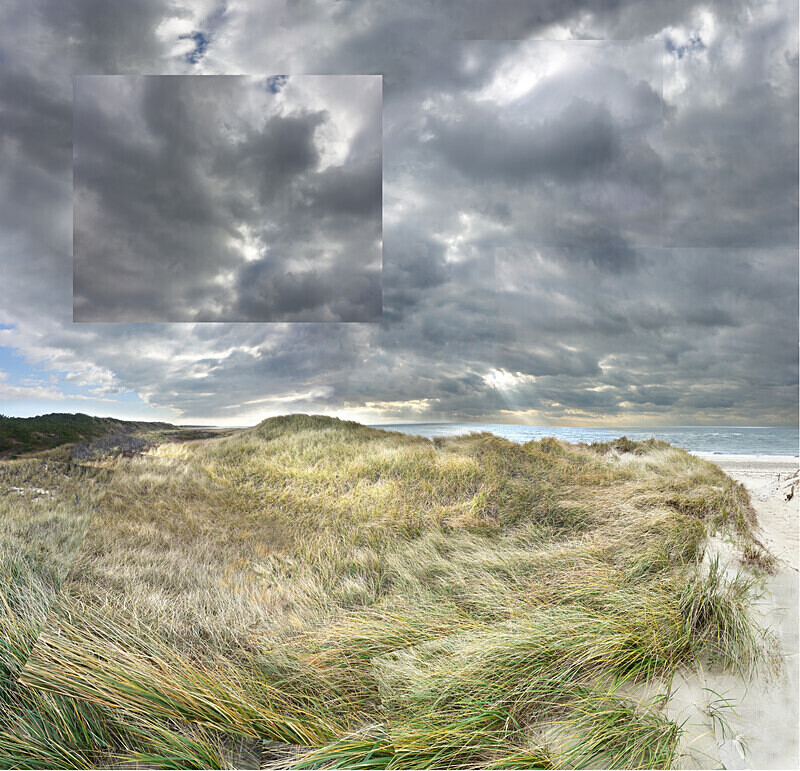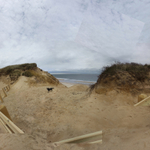Brain Storms Cape Cod (#7)

In November the dune grass is golden having lost most of its summer green, while the ever-changing sky projects a moving pattern on surfaces below.
When I could see any blue sky I took to the coast. In this composition, the ocean has turned cerulean where the sun breaks through. The alchemy of weather conditions creates a kaleidoscope of tints and tones. The grey clouds take on washes of blue and the grasses show warm notes of red and yellow. But a moment later all can move towards flat monochrome.
Thoreau was mesmerized by this landscape. He gets lost in recalling the colors he observes. In the Beach Again chapter he describes the ever-changing color of the sea. "There were distinct patches of the color of a purple grape with the bloom rubbed off." He notes green, blue, silvery, dark blue, and wine colors.
He writes "Again we took to the beach for another day (Oct 13), walking along the shore of the resounding sea, determined to get it into us." Chapter 9 The Sea and the Desert.
In the final pages of Cape Cod, Thoreau travels back to Boston by sea and he recommends to his readers a visit to Cape Cod in the Fall or Winter. Although he predicts vacation compounds being built for pleasure seekers, with Thoreau the landscape or in this case, the sea-scape is no trivial matter for mere enjoyment. He compares the Cape shoreline with as many as he is familiar with and announces Cape Cod as the clear winner. Why exactly? Well, that is what Thoreau seems to be struggling to digest as he walks, and ruminates.
Cape Cod for me is an ongoing battle between the destructive forces of the ocean and the sublime power of the infinite found in the natural world. In the end, Thoreau chooses the latter as his final assessment. With a sense of respect, he allows the habits of the native Cape Cod residents to clinch the deal.
Thoreau writes: "As for the view, the keeper of the light, with one or more of his family, walks out to the edge of the bank after every meal to look off, just as if they had not lived there all their day. In short, it will wear well. And what picture will you substitute for that, upon your walls?"
No matter how many lives have been taken by its power, the sight of the sea is an elixir, a refreshment, and a visual poem to be recited over and over again.
When I could see any blue sky I took to the coast. In this composition, the ocean has turned cerulean where the sun breaks through. The alchemy of weather conditions creates a kaleidoscope of tints and tones. The grey clouds take on washes of blue and the grasses show warm notes of red and yellow. But a moment later all can move towards flat monochrome.
Thoreau was mesmerized by this landscape. He gets lost in recalling the colors he observes. In the Beach Again chapter he describes the ever-changing color of the sea. "There were distinct patches of the color of a purple grape with the bloom rubbed off." He notes green, blue, silvery, dark blue, and wine colors.
He writes "Again we took to the beach for another day (Oct 13), walking along the shore of the resounding sea, determined to get it into us." Chapter 9 The Sea and the Desert.
In the final pages of Cape Cod, Thoreau travels back to Boston by sea and he recommends to his readers a visit to Cape Cod in the Fall or Winter. Although he predicts vacation compounds being built for pleasure seekers, with Thoreau the landscape or in this case, the sea-scape is no trivial matter for mere enjoyment. He compares the Cape shoreline with as many as he is familiar with and announces Cape Cod as the clear winner. Why exactly? Well, that is what Thoreau seems to be struggling to digest as he walks, and ruminates.
Cape Cod for me is an ongoing battle between the destructive forces of the ocean and the sublime power of the infinite found in the natural world. In the end, Thoreau chooses the latter as his final assessment. With a sense of respect, he allows the habits of the native Cape Cod residents to clinch the deal.
Thoreau writes: "As for the view, the keeper of the light, with one or more of his family, walks out to the edge of the bank after every meal to look off, just as if they had not lived there all their day. In short, it will wear well. And what picture will you substitute for that, upon your walls?"
No matter how many lives have been taken by its power, the sight of the sea is an elixir, a refreshment, and a visual poem to be recited over and over again.

|















